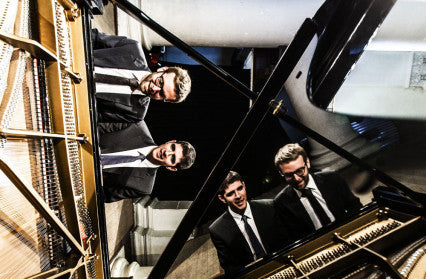
Wales Arts Review - Live | Françoise-Green Piano Duo
Wallace, a 21-year-old student at the RWCMD, had already caught the attention of the duo at a masterclass and as a result was commissioned by them to write a piece called Astral Travel for their appearance at last year’s Vale of Glamorgan Festival.
The latest work, named after a real place in Vienna and given its premiere at this concert, is a reflective vignette seemingly heard after-hours through the café’s lingering skein of smoke, and it combines lightly pressed jazz chords with allusions to French impressionism and Webernesque spaces. In terms of a café frequented by garrulous arties, it is shortlived and reticent, but cleverly suggests a house pianist musing on where the music discussed by patrons over coffee and Griensteidltorte was actually headed; or, maybe, it was just time to enjoy some peace and quiet before closing time. Wallace, from Surrey, is a pupil of Joseph Davies at the college and has also studied there with Peter Reynolds. In Café Griensteidl, composition was simply a case of dividing the Steinway’s keyboard into depths and heights for a piece that sounds almost as though it could be accomplished by one player.
Françoise-Green are planning a ‘Viennese Salon’ residency at St John’s Smith Square, London, to include the complete Mozart piano sonatas for piano duet, a selection of piano works for four hands by Schubert, and arrangements of famous orchestral pieces of the Second Viennese School; among them Schoenberg’s two chamber symphonies, the orchestral interludes from Berg’s Wozzeck and Mahler’s Sixth Symphony (arranged by Zemlinsky). Berg’s arrangement of Schoenberg’s Chamber Symphony No.1 was played at this concert before the pianists went off for a well-deserved breather. Well, the arrangement was advertised as being by the composer but Mr Green insisted it was Berg’s work. The provenance appears imprecise. Schoenberg is recorded as having created a four-hands version in 1906. They were both keen to come up with something playable.
 By any account, the exercise was difficult, but if there were physical repercussions for the performers they didn’t show. Although Green, the bigger and taller of the two by far, occupied the basement all evening, it was impossible to distinguish between them in terms of touch and timing. It is not so much the language but the length of utterance in this work that puts so much pressure on the players in addition to coping with the joint territory just below and above middle C. Unlike the Wallace piece, which might have been one pianist at work if the listener didn’t know, this was two pianists sounding like one with superhuman powers of reach and expression in dealing with angular themes and wavelike forward movement. It was so persuasive a performance that one was inclined to re-think the whole concept of transcription and how transcribed work, when performed as convincingly as this, has a life of its own freed from the context of drawing-room intimacy.
By any account, the exercise was difficult, but if there were physical repercussions for the performers they didn’t show. Although Green, the bigger and taller of the two by far, occupied the basement all evening, it was impossible to distinguish between them in terms of touch and timing. It is not so much the language but the length of utterance in this work that puts so much pressure on the players in addition to coping with the joint territory just below and above middle C. Unlike the Wallace piece, which might have been one pianist at work if the listener didn’t know, this was two pianists sounding like one with superhuman powers of reach and expression in dealing with angular themes and wavelike forward movement. It was so persuasive a performance that one was inclined to re-think the whole concept of transcription and how transcribed work, when performed as convincingly as this, has a life of its own freed from the context of drawing-room intimacy.
The duo idea of four hands getting more out of a piano than it’s customarily obliged to deliver was illustrated to perfection in Mozart’s Sonata in C, K.521 and the Fantasie in F minor, D.940 by Schubert.
So adventurous was the playing in the Schubert that the tolling recall of the melancholy opening tune gave the interpretation an emotional weight it could scarcely bear; not even the double fugue towards the end or the tune’s temporary demotion to second subject within could bury its insistence, and there it was again at the end, sounding enervated but unbeaten, a bit like the two who played the work. The opening Mozart sonata more than most performed on the night concentrated minds on exactly what reduction for piano was historically all about: namely, a ‘gathering’ at the piano amidst a wider intimate assembly of listeners in a confined space, so that we were witnessing music in extension – of sound and social milieu. The three movements were played with matching wit and animation, their charm reflected in the evident enjoyment these two derived from performing together and responding to the part for which each was responsible. Without doubt an addition to the world’s great duo pianists.
Images courtesy of http://www.francoise-green.com/
Dora Stoutzker Hall, Royal Welsh College of Music and Drama, Cardiff, January 14 2016
Antoine Françoise and Robin Green (piano)
Mozart: Sonata in C, K 521
Schoenberg: Chamber Symphony No.1, Op. 9 (arr. Alban Berg)
Andrew Wallace: Café Griensteidl
Schubert: Fantasie in F minor, D.940
Source: Source: Wales Arts Review, 18.01.16 ( Author: Nigel Jarrett )
Next Claves release on August 2016 !
Related collections
Francoise-Green Piano Duo
Franz Schubert
György Kurtág
Johann Sebastian Bach
New releases
Piano
Piano 4 hands
Popular products
Releases 2015 - 2017
Online
Find this album online
iTunes: http://apple.co/1qDQS5F
GooglePlay: http://bit.ly/1YGPSsv
Qobuz: http://bit.ly/1P03JVu
AmazonMp3: http://amzn.to/1UBL3CF


Commentaires
0 Commentaires